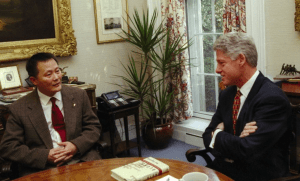Journal of Political Risk, Vol. 7, No. 7, July 2018

Japan Maritime Self-Defense Force guided missile destroyer JS Chokai (DDG-176) launches a missile as part of Rim of the Pacific, 2016. China’s newest development, still under construction, is its own missile destroyer, the probable Type 052D (DDGHM). However, the Chinese media recently released ground photos of the destroyer with reports suggesting that vessels of this class are ready to be handed over to the People’s Liberation Army Navy (PLAN). Source: U.S. Pacific Fleet via Flickr.
Anders Corr, Ph.D.
Publisher of the Journal of Political Risk
On the night of July 16, four days after the second anniversary of the July 12 Permanent Court of Arbitration win by the Philippines against China in the Hague, a Chinese missile tracking ship with 远望 Yuan Wang 3 (YW-3) emblazoned on the side, eased up to Sasa Wharf in Davao, Philippines. Davao is the home turf of President Rodrigo Duterte, now in Malacañang Palace, and the ship was likely visiting at his personal invitation. The Chinese characters for Yuan Wang (远望) mean “gazing into the distance”, and are sometimes translated as “long view”.
Last month, two People’s Liberation Army Air Force (PLAAF) Ilyushin-76 (IL-76) military cargo planes visited Davao. They were called a “personal favor” by President Duterte to China, and surprised the Philippine military. The visits were not covered by treaty.
Only the U.S. and Australia have visiting forces agreements that allow, and legally constrain, U.S. and Australian military presence. China has no such public constraints, and for that reason as well as others detailed below, poses a risk to Philippine sovereignty. Last year, Davao also hosted a People’s Liberation Army Navy (PLAN) guided missile destroyer, guided missile frigate, and replenishment ship.




